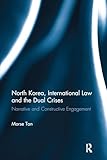North Korea, international law, and the dual crises : narrative and constructive engagement Morse Tan
Material type: TextLanguage: Eng. Publication details: Routledge 2015 London & New YorkDescription: 296p. 15.6 x 1.8 x 23.39 cmISBN:
TextLanguage: Eng. Publication details: Routledge 2015 London & New YorkDescription: 296p. 15.6 x 1.8 x 23.39 cmISBN: - 9781138614505
- 342.5193085 TAN
| Item type | Current library | Call number | Materials specified | Status | Date due | Barcode | |
|---|---|---|---|---|---|---|---|
 Books
Books
|
Rashtriya Raksha University | 342.5193085 TAN (Browse shelf(Opens below)) | Available | 11889 |
The Democratic People's Republic of Korea (DPRK) has a reputation as one of the worst human rights situations in the world. This book utilizes a unique international law perspective to examine the actions and inactions of North Korea with regard to international security and human rights.
Adopting political, military, historical and legal perspectives, the book explores how the two issues of nuclear weapons and the human rights abuses in North Korea are interconnected, and why the international community should apply the same international law framework to find a solution for both. Drawing on eyewitness accounts, such as refugee and defector testimony, Morse Tan offers a real-life story of North Korea that covers the pertinent law, and constructive approaches of its regime. Tan examines the specific objectives and actions of the North Korean government, and measures these according to international legal obligations such as applicable treaty law, jus cogens norms, and customary international law.
The book concludes by offering solutions for dealing with international security surrounding the Korean Peninsula, and forwards a proposal for the creation of a tribunal to prosecute those at the top of the regime for international crimes and human rights abuses.
As a project exploring the extremes of international law violation, this book will be of great interest and use to readers interested in the history, and political and legal implications of the strategies employed by the North Korea government.
Adopting political, military, historical and legal perspectives, the book explores how the two issues of nuclear weapons and the human rights abuses in North Korea are interconnected, and why the international community should apply the same international law framework to find a solution for both. Drawing on eyewitness accounts, such as refugee and defector testimony, Morse Tan offers a real-life story of North Korea that covers the pertinent law, and constructive approaches of its regime. Tan examines the specific objectives and actions of the North Korean government, and measures these according to international legal obligations such as applicable treaty law, jus cogens norms, and customary international law.
The book concludes by offering solutions for dealing with international security surrounding the Korean Peninsula, and forwards a proposal for the creation of a tribunal to prosecute those at the top of the regime for international crimes and human rights abuses.
As a project exploring the extremes of international law violation, this book will be of great interest and use to readers interested in the history, and political and legal implications of the strategies employed by the North Korea government.
There are no comments on this title.

